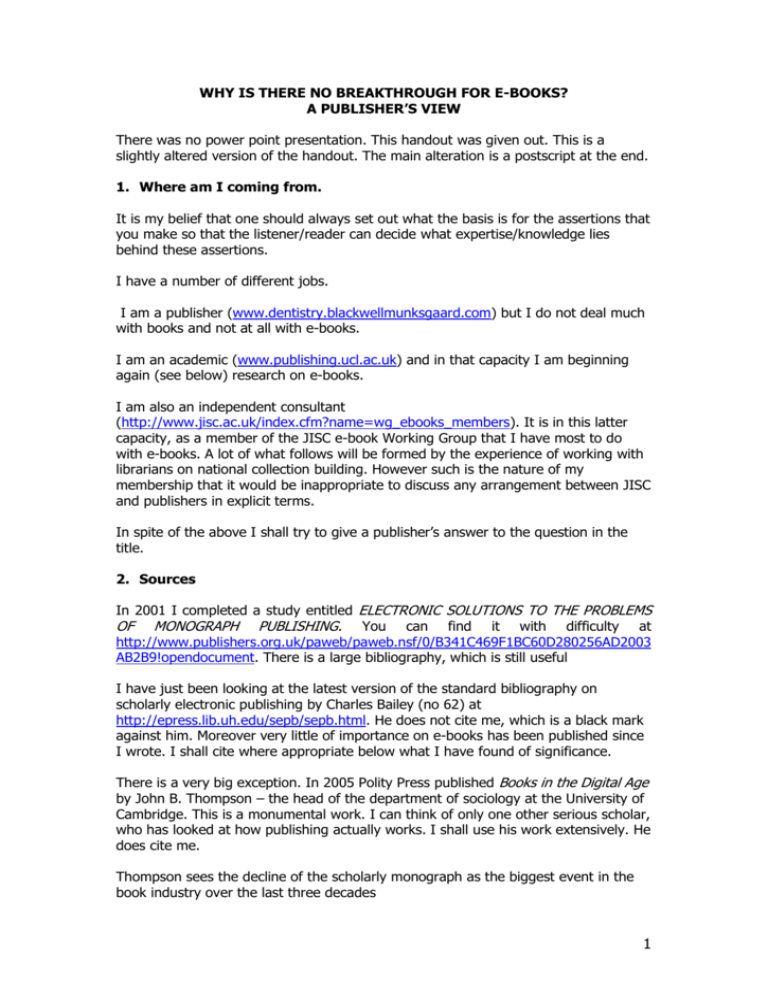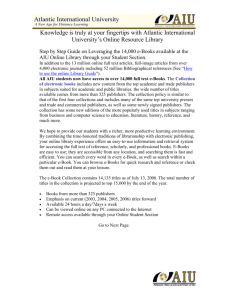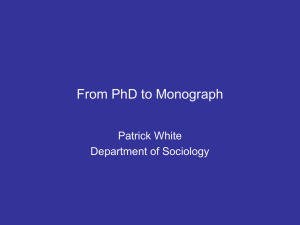word document
advertisement

WHY IS THERE NO BREAKTHROUGH FOR E-BOOKS? A PUBLISHER’S VIEW There was no power point presentation. This handout was given out. This is a slightly altered version of the handout. The main alteration is a postscript at the end. 1. Where am I coming from. It is my belief that one should always set out what the basis is for the assertions that you make so that the listener/reader can decide what expertise/knowledge lies behind these assertions. I have a number of different jobs. I am a publisher (www.dentistry.blackwellmunksgaard.com) but I do not deal much with books and not at all with e-books. I am an academic (www.publishing.ucl.ac.uk) and in that capacity I am beginning again (see below) research on e-books. I am also an independent consultant (http://www.jisc.ac.uk/index.cfm?name=wg_ebooks_members). It is in this latter capacity, as a member of the JISC e-book Working Group that I have most to do with e-books. A lot of what follows will be formed by the experience of working with librarians on national collection building. However such is the nature of my membership that it would be inappropriate to discuss any arrangement between JISC and publishers in explicit terms. In spite of the above I shall try to give a publisher’s answer to the question in the title. 2. Sources In 2001 I completed a study entitled ELECTRONIC SOLUTIONS TO THE PROBLEMS OF MONOGRAPH PUBLISHING. You can find it with difficulty at http://www.publishers.org.uk/paweb/paweb.nsf/0/B341C469F1BC60D280256AD2003 AB2B9!opendocument. There is a large bibliography, which is still useful I have just been looking at the latest version of the standard bibliography on scholarly electronic publishing by Charles Bailey (no 62) at http://epress.lib.uh.edu/sepb/sepb.html. He does not cite me, which is a black mark against him. Moreover very little of importance on e-books has been published since I wrote. I shall cite where appropriate below what I have found of significance. There is a very big exception. In 2005 Polity Press published Books in the Digital Age by John B. Thompson – the head of the department of sociology at the University of Cambridge. This is a monumental work. I can think of only one other serious scholar, who has looked at how publishing actually works. I shall use his work extensively. He does cite me. Thompson sees the decline of the scholarly monograph as the biggest event in the book industry over the last three decades 1 I mentioned the JISC eBook Working Group. The home page is http://www.jisc.ac.uk/index.cfm?name=wg_ebooks_home. There are some useful studies available through that site and commissioned by the EBWG. There is a new study due to report by September, which examines consortia-type negotiations to establish a win/win model. There have been a number of interesting conferences some of which are only accessible to members of organisations such as STM (Books 2.0) and others in the pages of a journal available to subscribers only – UKSG in Serials (E-Books: the new serial) Finally both Elizabeth Chapman and I shall mention the project at UCL which we are both involved in. This is called SuperBook on an analogy with the very important SuperJournal project in the last century. I have just written an account of this project in the last issue of Against-the-Grain. There will be publications as findings become available: as they are accepted they will be posted at www.publishing.ucl.ac.uk. 3. Coverage I shall consider e-books in academic libraries and concentrate on monographs and textbooks. I know more about monographs than textbooks and less about reference. It is perhaps a mistake not to write about reference books, which have had the best take-up and seem to work possibly because they are most like journals. I apologise. I am not interested in e-books bought by the general public or e-readers used by the general public. However developments in general use of the Internet impact on the specialist behaviour of scholars. As far as delivery is concerned I am assuming online delivery downloaded on to personal computers. My understanding is that is the normal mode of delivery. There are some interesting developments involving PDAs used in the medical environment but (as far as I know) purchase of materials for these devices is handled differently. 4. Where were we? By 1995 at least two publishers had their entire journal programme online and a year later the Big Deal was inaugurated (Academic Press and OhioLink) – see http://units.sla.org/division/dmil/mlw97/sanville/tsld004.htm. In 2001 Cliff Lynch in a seminal essay [Lynch, Clifford. "The Battle to Define the Future of the Book in the Digital World." First Monday 6, no. 6 (2001). http://www.firstmonday.dk/issues/issue6_6/lynch/index.html] wrote: Every major newspaper and magazine seems to be running regular articles about e-books. I suspect more words are being published about the e-book phenomenon in print than have actually been placed into e-books so far. In my own work on e-monographs (see above) found very little actual activity except where aggregators like NetLibrary offered to convert free of charge. In another publication in 2001 (Publishing 2001 BPI Communications Inc pages 30-36) I characterised publisher responses to a questionnaire as confusing knowing 2 something about e-books with doing anything about e-books. In the same year a survey by JISC EBWG found that of 20 publishers all 20 were involved in e-books or thinking seriously about them. Someone is fooling someone. Dipping a toe into the water (phase one) and “kissing frogs” (phase two) were two publisher offers of strategies then and even now to some extent. The biggest problem perhaps was lack of critical mass. 5. Where are we? I have seen estimates from some publishers than in 2006 less than 5% of their revenue from book sales comes from sales of e-books. There are exceptions e.g. see Source OECD (http://www.databeuro.com/acatalog/SourceOECD_Flyer2005.pdf) and Google on Toby Green. Also see his article in Learned Publishing 17:1 (2004) I have not yet done a thorough survey. However most major publishers seem now to have developed a real strategy and are just beginning to roll it out. Some of the sites show a clear and articulated approach – see for Springer http://www.springer.com/cda/content/document/cda_downloaddocument/ebook%20 FAQ%20FINAL%2006.09.06.pdf?SGWID=0-0-45-287089-0. Aggregators like NetLibrary – still the one with the most publisher content, Coutts (http://www.couttsinfo.com/en/econtent/econtent.html) and the Australian ebooks.com are good for toe-dipping. EBrary has reinvented itself (http://www.ebrary.com/corp/about.htm). Are any of these aggregators providing the sort of service the users/libraries really want? Perhaps most important is the re-engineering of traditional library suppliers like Yankee Book Peddlar (see article by Bob Nardini in Against-the-Grain)? Particular interesting to publishers is BookStore from MPSTechnologies – “Building your electronic warehouse for the future”. See http://www.mpstechnologies.com/pdfs/BookStore-Brochure.pdf. This gives control - of content and income. There may be critical mass. Have we moved to the full Monty – the rolling out of the total offer. Some sites look like this e.g. http://www.informa.com/corporate/external/goto.htm?url=http://www.ebook store.tandf.co.uk/. There is a full range of options Notice how individual purchase is balanced by library purchase – a different situation from the journal model where individual purchase is in most cases ignored. The key is in the investment. This is not (yet) the change of model you have got with journals. E-Books remain the exception not the norm in a print world where books are actually looking a better bet than they did a few years ago. 6. Why bother about e-books anyway? 3 There are plenty of good reasons to suggest that for many purposes print books (pbooks) are more useful than e-books e.g. readability and portability. Part of the reason is that they are written as p-books. The total message involves a lot of space. Does anyone really want to read this long argument on the desktop or the laptop? Is this intrinsic to books, what books are all about? The suggestion that an e-book is a convenient way to deliver the content (PDF) is unfashionable but is it unrealistic? In other ways however e-books have the edge. Thompson (p318-20) writes: Where does the use of new technologies enable content providers to add real value to their content, value which is sufficiently important for end users (or for intermediaries like libraries) that they are willing to pay for it? He answers his own question as follows focussing on the online environment: 1. 2. 3. 4. 5. 6. Ease of access - 24X7 and by lots of people rather than just one. Updatability – changes can be frequent and easy. Scale – access to large quantities of material Searchability – search engines and suchlike Intertextuality - links Multimedia – not just text. How do these advantages relate to the e-book as we know it? Some comments later 7. A short answer The question is set as the “fundamental conundrum” at the STM Budapest conference in May: Despite the fact that we live in the Information Age, book publishers have by and large not participated in the explosive growth in the demand for information. There has been no breakthrough for e-books, because (you could argue) publishers have not published enough of the right e-books in the right form and on the right terms. But of course it is more complicated than that. It is certainly a financial problem. It is a problem at heart of sustainable models. You could argue that the only model that everyone knows and everyone hates is the one book one user model originally introduced by NetLibrary. It could also be a problem of vision. There is also of course at the user/library end the problem of smaller book budgets, the squeeze caused by the purchase of journal bundles. 8. The problems of finding a model for monographs 4 Monographs do not make any money anyway Dual editions cost more than just electronic or print Customers expect e-versions to be cheaper Their sales are currently lower There is not enough money to pay for the fixed costs I wrote at length about this – see above. The situation remains much the same as far as I can tell. I concluded that models like Oxford Scholarship Online were likely to be the best bet. Look at the article by Sophie Goldsworthy in the latest issue of Learned Publishing (19:3). Perhaps the most interest aspect of a frank description is the constant changing of models. Essentially such bundles are THE BIG DEAL in a different context and they are less satisfactory than the big deal as less to offer. Maybe increasing activity by aggregators may help to sustain the monograph? 9. The problems for finding models for textbooks Thompson explains the problems about package inflation. I notice that the Federal Government may be enquiring into textbook price rises. The price of textbooks have increased such a lot because of package inflation and the used-book phenomonen. Like you I have looked at some e-textbooks. The text is chopped up. There are extra bells and whistles (e.g. Flash) and there is a lot of self-assessment. These books are sold to students as alternatives to print, but they are adaptations of print not taking advantage of the medium In the UK libraries want a deal over textbooks so that they can (as it were) replace their short loan collection by a wonderful resource accessible to all. Publishers want cannot see the deal. Why replace sales to 100 students with one sale to a library which is going to bring in much less money than the payment by 100 students even allowing for no discounts to booksellers and no printing costs. 10. Are publishers really taking advantage of the e-form? Could we rephrase this – are publishers delivering what is wanted even though we do not know what is wanted? Probably the answer is negative. Let us go back to the list provided by Thomson (section 6): 1. Access – you get 24x7 but many models insist on restrictions on the numbers accessing and where the access is from. 2. There have been attempts to update texts and encyclopaedias but the cost and management is very difficult e.g. Encyclopaedia of the Life Sciences. The Wiki has really worried publishers. 3. Scale – some “progress” but not except for the Darnton project with monographs. 4. Searchability – most monographs are PDF. 5 5. Intertextuality – Links need to be put in and they demand XML or HTML but are they not important. In this case I think we do know that readers want to link through seamlessly (see the CIBER group research passim) 6. Multimedia – perhaps. 11. Deconstruction Is the chapter economy the answer or is it, like the article economy, somehow unsustainable. The chapter has not in the past been the basic but it could be though authors need to be “trained” and metadata has to be extracted from them. Is the book as a construct no longer appropriate in the digital world? I think it is appropriate as I have hinted at above: the book tells the “long story”. 12. New monograph models Why bother about publishers at all when new models of scholarly communication are coming in which usually involve librarians liberating scholars? See for example the ACRL Institute for Scholarly Communication http://www.ala.org/ala/acrl/acrlissues/scholarlycomm/scinstitute.htm. Does the OA model have a place? For example see ANU Press at http://epress.anu.edu.au/. Is it the last resort? Does anyone really believe funding from a university is sustainable? There is the model being pushed by Joe Esposito variously called the Platform or the Processed book, which owes something to the Darnton pyramid. At least I think they are the same thing and at any rate the processed book, the expansion of the “primal book” is explained in FirstMonday 8:3 Where do Google, Amazon, Yahoo and indeed Microsoft fit in? 13. New learning models Virtual Learning environments do not seem to leave space for e-books and the new big packages seem to live in a parallel universe. I am not thinking so much of the Open Textbook project – an extension of wiki world. See http://www.opentextbook.org/ but rather that large sections of learning at least at the VoTech/FE level do not seem to take books into account. 14. Prospects for e-books The advantages are still there but who pays? Print also retains advantages. Once again we are looking at a hybrid library problem with both print and e-publications available alongside of course digitised publications. 15. POSTCRIPT It turned out that this presentation was more provocative than I had thought it would be. There were significant arguments made in later presentations, which made the point that the user is not interested whether the information he or she wants is from a book or a journal: it is just “stuff” and it is wanted quickly and easily. 6 Although there is of course some truth in this contention it seems to me that it misses out what authors do and want. Publishers are very familiar with authors and those excellent consultants who see the big picture but have never dealt with an author tend to miss out on insights that relate to authors. Authors want to publish a book or a chapter and are not writing “stuff” to put into a database unless they are preparing material for an encyclopaedia. Yes, they do that but it is a different exercise for them. Publishers see no sign of this wish to write books dwindling in spite of (in the UK) the hostile pressures of the Research Assessment Exercise, which on the whole does not rate books highly. There are similar pressures elsewhere so we are not talking of a British phenomenon. Whatever may happen in the future publishers faced with the problem of how to take advantage of the possibilities of the digital environment without losing money are starting from the traditional book going online. They could be thinking from first principles, of the very different structure that might well be envisaged if one started from scratch from a user viewpoint – but they are not. 2nd Anthony Watkinson Centre for Publishing University College London August 2006 revised 9th September 2006 a.watkinson@ucl.ac.uk anthony.watkinson@btopenworld.com 7

